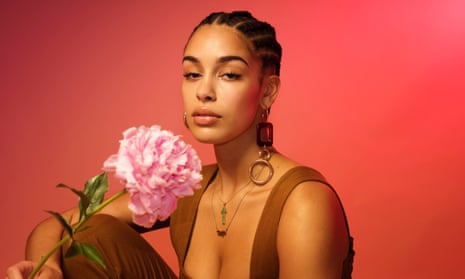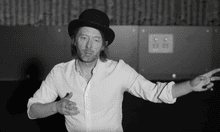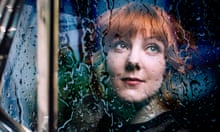Due to what she will only describe as “a sewage problem”, Jorja Smith urgently needs to move house. Her requirements – two bedrooms, a nice bathroom, presumably the absence of sewage – are generally modest, but being a pop star she will also need space for her “two huge pink velvet sofas”. She thinks she may have found somewhere in west London: it will be the 20-year-old singer’s fourth London home since moving down from the West Midlands just two years ago. “South London was good,” she explains, “but I always get recognised. And I’m not even that famous yet.”
STOP RIGHT THERE. Two big words in that last statement: “that” and “yet”. The former is an acknowledgment that while Smith is not in fame’s Bieber/Grande/Madeley strata, she’s far from unknown: tracks such as powerful social commentary Blue Lights are all over the radio, the likes of Drake and Stormzy have made music with her, and she enjoyed a big primetime moment at this year’s Brits, where she won the critics’ choice award. As for the fact that she is not that famous yet, her debut album might see to that: a mix of modern jazz, contemplative soul and dancehall so perfect for summer evenings that B&Q should bundle it with their barbecues.
Smith seems to handle being not even that famous yet rather well, but she has put in the practice. Not so long ago, but before everyone was wanging on about her being UK pop’s brightest new hope in years and she was still working in Starbucks, she would take time out in the stock cupboard to interview herself about her career. “I used to pretend I was talking to [1Xtra DJ] MistaJam,” she laughs. (Smith laughs a lot more than you’d expect from listening to her music. Big old cackly, go-any-further-and-you’ll-snort laughs. Great laughs.)
“I’d only have about 10 seconds,” she continues. “I’d go in and be like: ‘How do you feel doing this?’ ‘How will that affect this?’ I’d act out stuff all the time. I talked to myself loads when I first moved here.”
Smith grew up in the house whose front room can be seen in the YouTube clip that changed her life. The video, one of many she uploaded in her mid-teens, shows her performing a 2011 Alex Clare song. “I used to watch YouTube,” she remembers, “and I’d see people doing covers and having hits. I wanted to do that too, but it didn’t really work.” It kind of worked, though: the Alex Clare cover was spotted by a music industry bloke who got in touch and asked to meet up. “I told my dad, because obviously it’s weird,” she says. But it turned out not to be weird, so Smith suddenly had a manager.
I ask her to show me her childhood street on Google Street View, and before long we’re outside her old house. Smith points out the family camper van parked outside and begins a tour of the neighbourhood: where she’d get the bus to school; where the kids would play; the old people’s home where she helped out for her Duke of Edinburgh award (which she completed, although she never collected the award itself). At the top of her street, the road gets wider, the trees get leafier and the houses get bigger and have driveways; Smith used to walk her dog near there, she says, and she shows me the house she always wished she could one day live in. Then we go back down the road, right down to the bottom where it’s “a bit more rough; a lot of the stuff was closing down”.
One shop that hasn’t closed is the local Co-op, and perhaps it never will because it is surely eligible for listed-building status following an episode one night last year that saw Smith – who had performed that evening in Birmingham supporting Drake – taking the gig’s headliner shopping. Just to underline that: Drake went shopping in a Walsall branch of Co-op. “I wanted wine gums and tampons, and he decided he wanted to come and see the Co-op where I grew up,” is Smith’s matter-of-fact account of the night. Did Drake offer to pay for her shopping? “No.” What does Drake smell of? “Executive realness.”

So we know that Smith likes wine gums, which is great news because those are the best sweets. Other things it’s important to know about Jorja Smith: she’s furious that she has fewer social followers than spooky CGI pop star Lil Miquela (“She’s not real! She doesn’t have genitalia!”). She would rather be one inch shorter than one inch taller. She reluctantly holds the bleak belief that hats simply don’t suit everybody. On the debate that continues to rage over the versatility of the potato versus the versatility of the egg she prefers eggs “but you can do a lot with each”, and her preferred potato treatment is roast. She is also “quite dramatic”. When, as a child, she pushed her brother and he cut his mouth, her response was to flee the scene. Her mother is currently making her a dining table out of an old church altar. She isn’t unduly concerned by the fact that parrots can talk (“They can’t talk, they mimic, it’s soundwaves”), but she does express alarm (“AARGGHH!”) at the recent news that a parrot learned how to control an Amazon Echo. If parrots and AI were to conspire to take over the world, she says, she would like parrots to be the planet’s ultimate rulers. She has never touched a parrot, although she has “definitely touched an owl”. Oh, and when she won this year’s Brits critics choice, she was the first independent artist to have even been nominated, let alone take home the trophy.
Jorja Smith is indeed independent, although she’s hardly in the photocopying-her-own-flyers-at-Ryman lane, and it would be a mistake to conflate her independence with total unsignedness. Smith releases music through her label FAMM, but she is also part of Platoon, a self-styled “platform for fearless creatives” invented two years ago by a venture capitalist and a former Apple consultant. Smith says Platoon “gets my music on Apple Music and Spotify and everywhere it needs to be”. It sounds like the sort of label-but-not-a-label you’d want to work with, if you – like Smith – could see the whites of stardom’s eyes in 2018. It has incubated artists such as Stefflon Don and Billie Eilish on their way to major-label deals, while current artists such as Rex Orange County and Smith have retained their independence within an impressively nimble, apparently scalable, label-style infrastructure.

Which is all lovely, and Smith’s monthly streaming stats are on a par with Sigrid, who won the BBC’s Sound of 2018 poll. But while Sigrid, who is signed to a major label, has had a Top 10 hit, Smith has not yet gone Top 30. If Smith had signed a conventional deal, might she have had a hit by now? “That’s a ‘what if’ question,” she observes, adding with mock melodrama: “I don’t answer those.” Does it surprise her, then? Doesn’t she think it’s a bit weird – with her massive profile and so on – that she hasn’t had a solo hit single? “I don’t know. Did Amy Winehouse have a hit single from Frank? I love Frank, but people didn’t really pay attention to her until Back to Black. So no, I haven’t had a hit single. I personally am not bothered about that.”
That is not to say that others haven’t attempted to cajole her in a different direction: one recording session, she remembers today, involved the producer trying to use sounds from Justin Bieber’s Sorry. Her publishers, Smith adds, are keen that she delivers something upbeat. “They’re like: ‘Write a fast song, write a fast song!’ No! I don’t want to. I write what I want to write. ‘Upbeat songs get played on the radio.’ So? And they want me to work with certain producers who’ve made hits, but just because they had a major hit doesn’t mean they’ll have another one.” Smith’s album seems good evidence that sticking to her guns has been a wise move. “With a label, pressure is added,” she reasons. “Being independent you don’t feel a lot of pressure. A lot of people say I’ve been putting out music slowly. But I like how I’ve done things.”
Slow and steady may yet win the race. Smith talks fondly of the 70s hi-fi setup she has at home: the speakers are knackered but she enjoys the magic of listening to old music on equipment of the time. And the good thing about vinyl, she says, is that you can’t skip tracks: “That’s what records are for: not to be skipped.” As to whether Smith herself has made an unskippable album … “Well, I think I have,” she says. “But my dad told me he skipped a song.” She looks briefly appalled. “I told him he wasn’t listening to it in the right order. But it’s fine if you do skip. Listen to it once all the way through, then pick your favourites.”
That’s right, ladies and gentlemen: release the doves; we finally have a recording artist who admits that the best way to consume an album is to drag, drop, order and chop. Don’t be too hasty with her album, though; beyond obvious megabelters such as Don’t Watch Me Cry there are plenty of tracks that really only reveal themselves after a few listens. There’s lots about love, including a song written during the beginning of her relationship with boyfriend Joel Compass. Created over a period of five years, it’s an album that takes its time, and deserves the same from the listener. Its title track, Lost & Found, recalls the period when Smith would travel to stay with her aunt and uncle in west London and the first time she went to Ladbroke Grove, and realised she was standing right where Carnival takes place. “And I realised I’m such a small girl in this huge world,” she says. “At times you do feel quite lost, but I knew what I wanted to do. I’m not saying I found myself – we’re all constantly finding ourselves – and I feel like wherever I go I’m still quite lost, but there’s a sense of ‘found’ in that I’m right where I want to be. Lost and found is how I feel.”
Jorja Smith seems like precisely the artist she wants to be, making precisely the music she wants to make, delivering it on precisely her own terms. “When I was 15,” she says, “all I wanted was to be selling out shows like Bieber. As I got older, I realised everyone’s come from a different place and everyone’s got their own path. I realised I just had to believe in myself, believe that I could do this. Now I am doing it.”
Lost & Found is out now










Comments (…)
Sign in or create your Guardian account to join the discussion